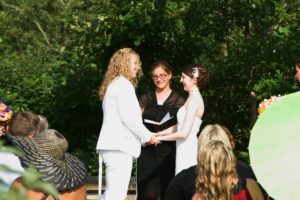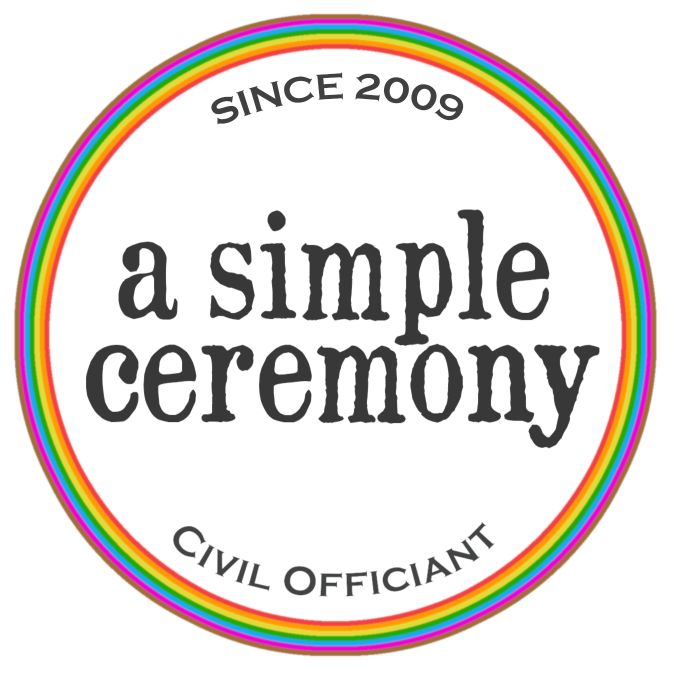
10 Tips for Reading at a Wedding
You have been asked to do a reading at a wedding, good for you! Whether or not you are used to speaking in public, I have put together some tips and suggestions to help you get through this. These are all important, so I hope I don’t lose you at talk like a robot. You’ll see if you read on.
 1. Practice
1. Practice
You already know this, of course you’ll practice! (Right?) Hear me out. You should read your selection enough times that you are familiar with it and really understand it. Read it out loud as you practice in front of a mirror and then in front of someone else. If you are too terrified to do even this, skip to tip #9.
When you’re practicing, really get the words down (use a dictionary if you have to), and look for phrasing that naturally allows you to take breaks to breathe. Then think about what the selection is communicating, what is the mood and the expression that may be intended.
Try these techniques for reading with expression: Read your piece once aloud a little like a robot, slowly, just saying each word. Then read it aloud in the most dramatic way possible. Shout it out, cry it out, be dramatic. Then, find a happy medium. Practicing in a way that’s a little over the top might help you retain some expression if you happen to get really nervous.
Also, I’ve heard people say that they want to be spontaneous, they think it will be better if they don’t over rehearse. Well, maybe that will work out, but unless you’re a professional speaker or have special talents to “wing it” in front of 100 or so people, plan to practice. When the excitement of that moment comes, you’ll be so glad you practiced and so will the couple that asked you to do the reading in the first place.
2. Slow – it – down
It’s generally best to slow down when you read for an audience. You may think you’re already reading slowly, but you’re still probably not slow enough.
Take small pauses at the natural phrase breaks, and look up from the page. Find significant words that you think deserve emphasis and pause before and after those words or small phrases.
Look at the couple from time to time, and don’t worry if it takes you a moment to find your place again when you look back down to continue. If anything, it will help you slow down. These pauses will give your audience time to comprehend the meaning of your reading, and that’s a good thing.
If your text includes humor, you can smile, and allow time for others to get the joke and laugh. You can laugh, too. Don’t talk over the laughter – be glad that you’re entertaining everyone, let it naturally die down and then continue. Sometimes the audience is afraid to laugh or doesn’t quite get that you’re being funny, because this is a wedding after all, and most people have been programmed to expect it to be boring – I have once or twice had to step out of character in reading to tell everyone in a fake whisper “That was a joke” or “It’s ok to laugh.”
3. Enunciate – each – word
This goes along with what I’ve been saying already, but even when reading nice and slow, you have to enunciate. [e·nun·ci·ate (əˈnənsēˌāt/) Verb. To say or pronounce clearly.]
Good clear pronunciation will help get the message across to everyone, whether the text calls for a faster reading of a few words or you are luxuriating over the lines like it’s a delicious cupcake to be savored. It is all for nothing if your words are not understood.
(Listen to Gilbert and Sullivan, “Modern Major General”)
Also, if you are unsure about a word – look it up, learn the meaning and correct pronunciation. You’ll feel better about it!
4. Be heard
Just like your teacher said, stand up straight – good posture helps you breathe better and project your voice. Your goal is to share this reading and be heard comfortably by everyone, including the person sitting furthest away. Your voice is produced by air passing through your vocal cords with some force behind it. The more air forced through, the better you’ll be heard. Imagine blowing out a birthday candle, it doesn’t work very well if you’re just puffing a bit, it takes a focused burst of air, coming from your diaphragm. Employ your diaphragm when you’re speaking.
Even if you are using a microphone, you must project your voice so the mic can pick you up, and hold it close enough to register the sounds – sometimes that means close enough to touch your chin.
So, now you are speaking slowly and enunciating, and also speaking loud enough for all to hear.
5. Convey emotion
This sounds harder than it really is. To get an idea across, it is sometimes as simple as putting emphasis on a single word. To communicate the right emotion, figure out which words you want to emphasize and why. Slow them down; adjust the volume high or low; pause – between – words. This makes your reading more interesting for others to listen to. It may seem overly dramatic to you because it may not be how you speak in a normal conversation, but that’s ok … you want to hold people’s attention, and this after all is not a normal conversation.
If your reading or poem contains repetition, find a way to read each line a little differently by putting emphasis on a different word or phrase.
For example, when saying the phrase “In a good marriage” the first time I say it I might emphasize the word “marriage”, then the next time I say it, I’ll emphasize the wood “good”. It just makes things more interesting.
If you are presenting a poem, find the natural phrases and line breaks, not necessarily stopping at the end of the line or as a sing-songy rhyme so you’re not saying each line the same each time. (See what I did there?)
If you need to make notes on your reading, do it – highlight, circle, use bold face type or all CAPS if that helps you remember to use emphasis.
When I make my printed copy, I add physical space on my page, marking the end of a line where I want to take a break,
sometimes right in the middle of a sentence
if it makes sense to pause there.
6. Feel good
Get a good night’s sleep, eat something ahead of time and drink plenty of water. I tell couples this, and it sounds like, duh, but if you know it’s going to be a long day, and if you’ll be nervous and busy getting ready, being hungry won’t help, and dinner might still be hours away. Also, probably don’t drink alcohol, save that for later.
7. Bring the Reading
Bring your own copy of the reading with you, printed in a large font you can read easily. You can even glue it to a fancy card so it’s easier to hold. (Please do not plan to read it off your phone, I know you wouldn’t really do that.)
8. Overcome nerves
Practice, practice, practice so you feel confident with your reading and performing ability. Practice deep breathing relaxation techniques. Using visualization can also help. Close your eyes and envision yourself walking up, taking that mic, and delivering the best damn wedding reading ever.
Attend the rehearsal if there is one. Arrive early on the wedding day so you can view the spot you will be standing in and get yourself an aisle seat close to the front, maybe you can even test the microphone to get a feel for it. Know your cue, probably an introduction with your name and the title of the reading. Take your time, smile and have fun.
If you still find yourself nervous when you walk up there, remember to breathe and start slow. Many people get nervous speaking in public, and everyone at that wedding wants you to succeed – they are rooting for you – they want to hear what you have to say. Give them what they want.
9. Last Resort
Hopefully this part won’t apply to you. But if, however deeply honored you are by being asked: you still vomit a little just thinking about speaking in front of people, be honest with the couple about it as soon as possible.
Don’t lose sleep over it. Tell them thanks, but you’re terrified of public speaking and really can’t do the reading. Trust me, it’s okay.
The couple getting married are your friends/relatives and don’t want to torture you – they would rather everyone be happy than have you throw up at their wedding. They’ll understand if you politely decline to do a reading, as long as you’re there to celebrate.
10. Remember the Why
Why are you doing this? Were you asked, did you volunteer? The only real reason that counts here is that you are participating in this wedding to make someone else happy on one of the most significant days of their life. Be they friends, relatives, children or parents, brother or sister to you, the couple getting married will appreciate your willingness, your effort, and simply your presence. So don’t worry about being perfect, even messing up, crying, laughing, or whatever else might happen. Just be your fantastic self.
In conclusion, I hope that this has been informative, educational, entertaining, and helps alleviate any stress you might have had in preparing to read at this wedding. Good luck, and may the force be with you.

